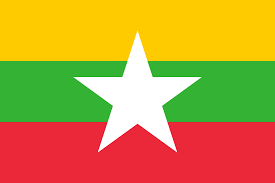Myanmar: Scorecard finds free expression under significant threat
Flag of the Union of Myanmar
Civil Society and Journalists in Myanmar Find that Free Expression and Media Freedom are under Significant Threat
New Reports Agree That Government Actions Have Led to a Decline in Free Speech and Media Freedom
2 May 2019, Yangon, Myanmar — Three years after Aung San Suu Kyi’s National League for Democracy (NLD) government took power in Myanmar, the third annual Freedom of Expression Scorecard released by a coalition of 18 civil society partners noted a significant lack of progress in instituting key reforms to secure free expression in Myanmar, as well as backsliding in some areas. The coalition, led by PEN Myanmar, pointed to the range of restrictive and unreformed laws and regulations, increased arrests and legal prosecutions for various types of expression, and threats and harassment of journalists doing their jobs, as key factors contributing to the low score.
The May 2019 Scorecard—compiled by PEN Myanmar and a range of 17 partners and issued on the eve of World Press Freedom Day on May 3—assesses the current landscape for free expression, examining and scoring the state’s performance on six key indicators: laws and regulations; media independence and freedom; digital freedom; information access; freedom of assembly, speech, and opinion; and safety and security. The total score of 6 out of 60 possible points indicates significant decline, with five indicators showing a regression in conditions and only one indicator, information access, showing a marginal progress. Participants called on the government to prioritize concrete steps to promote free speech and media freedom as core components of Myanmar’s nascent democracy and laid out six key recommendations as a roadmap to achieve this goal.
“While participants in the Scorecard process acknowledge that the challenges involved in reversing decades of repression are significant, in multiple areas the state has not only failed to reform, but has engaged in practices that explicitly threaten free expression," said U Myo Myint Nyein, President of PEN Myanmar. “We urge the government to put an end to this negative trajectory and engage in meaningful reforms, and to proactively organize public consultations with relevant stakeholders throughout every stage of the reform process.”
Among the Scorecard’s main findings for 2019:
The vast majority of laws restricting free expression have not been amended or repealed in a positive way, including the News Media Law, the Printing and Publishing Law, the Telecommunications Law, the Peaceful Assembly and Peaceful Procession Law, and criminal defamation provisions. Meanwhile, Section 66(d) of the Telecommunications Law has been used to bring dozens of cases against individuals for their online expression.
Dozens of cases have been filed to punish various forms of expression, speech, and assembly. Where cases proceed to trial, judicial decisions generally interpret the laws in the most punitive manner possible and in favor of the state or complainant. The unjust conviction and jailing of Reuters reporters Wa Lone and Kyaw Soe Oo, who have spent more than 500 days behind bars, has had a chilling effect on media freedom.
State interference in the media—including outright ownership, use of advertising and subsidies, and control over licensing—remains problematic, with no plans to close state-controlled print media and no timeline for fully implementing the broadcasting law.
Attacks and threats against journalists continue to occur—both by state and non-state actors, and the government generally does not condemn these attacks or does not investigate them adequately or punish the perpetrators. Media access to conflict zones, notably in northern Rakhine, Shan, and Kachin States, remains highly restricted.
“We join our colleagues, leaders from Myanmar’s media and civil society, in calling on the NLD government to reverse this trend and urgently prioritize free expression reforms,” said Karin Deutsch Karlekar, director of Free Expression at Risk Programs at PEN America. “Building a strong foundation for democratic development will be impossible without also safeguarding journalists’ ability to report on issues in the public interest without fear of retribution, ensuring citizens’ ability to access information, and protecting individuals’ ability to express themselves freely both on and offline.”
In recognition of the worrying decline in free expression, in May 2018 PEN America honored imprisoned Reuters journalists Wa Lone and Kyaw Soe Oo with the 2018 PEN/Barbey Freedom to Write Award; they were convicted in September on spurious grounds and have now spent more than 500 days behind bars as a result of their efforts to report on a massacre. In November, more than 50 of the world’s leading human rights and free expression organizations joined together to condemn the verdict and call for the journalists’ release. And on 22 December, PEN Myanmar presented an “Outstanding Protection of Free Expression” Award to Captain Moe Yan Naing, the police officer who testified at their trial, praising the whistleblower for practicing free expression and telling the truth despite the consequences for himself and his family.
The May 2019 Scorecard was developed and produced by PEN Myanmar with support from PEN America, and is available in English and Burmese.
###
CONTACT Anoosh Gasparian, External Relations Manager, PEN America: [email protected]
Han Zaw, Secretary, PEN Myanmar: [email protected], +95 944 308 1350

